The formatter threw an exception while trying to deserialize the message: Error in deserializing body of request message for operation 'Translate'. The maximum string content length quota (30720) has been exceeded while reading XML data. This quota may be increased by changing the MaxStringContentLength property on the XmlDictionaryReaderQuotas object used when creating the XML reader. Line 1, position 34273.
At the intersection where social media and entrepreneurship meet technology and racial issues, you will find Latoya Peterson hard at work changing American society.
The 27-year-old African American entrepreneur --who envisions new trans-media opportunities across Internet, TV, radio and print sectors amid a crumbling Old Guard corporate media infrastructure -- presides over one of the most important ongoing national discussions in America: race relations.
Racialicious
Peterson's blog, Racialicious.com, sounds like a deliciously cynical spoonful of an issue most Americans find difficult to swallow. But it has grown rapidly since 2004, when it was created by original owner, Carmen Van Kerchkove. In 2008, Peterson was brought on as editor and eventually purchased the blog when Van Kerchkove decided to retire earlier this year. The 500 readers a day several years ago have ballooned to a current high of 10,000 ... and the site is growing.
Peterson's dream of reshaping Americans' perceptions toward race relations and changing the way we talk about race collides with the reality of corporate media's vice-like grip on the megaphone of mass communications and the hidden problems of race relations in the media industry. Yet, in the nebulous cloud of national racial issues, where corporate media executives appear incapacitated and even U.S. presidents have failed to pull the American people together long enough to see ourselves in a mirror, Peterson and her crew of devoted volunteers have quietly paved a path of progress through Racialicious.com.
Michael Eric Dyson and Condoleezza Rice
Guest hosting on the Michael Eric Dyson Radio Show (Dyson is on hiatus writing his next book), Peterson's latest interview is with former Secretary of State and National Security Adviser Condoleezza Rice, which airs today. Secretary Rice discusses her new book, "Extraordinary, Ordinary People" and also weighs in on NPR's controversial firing of news analyst Juan Williams.
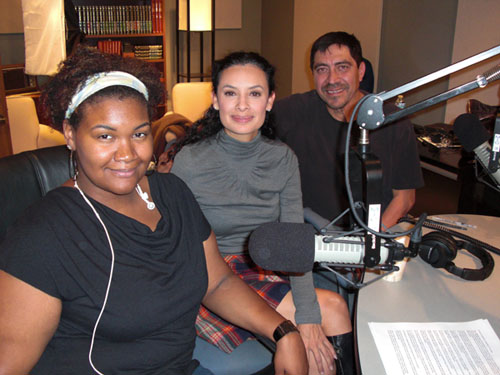
Guest Host Latoya Peterson (left) with Maria Teresa Kumar (center) of VotoLatino and Arnoldo Borja, a community organizer with the Legal Aid Justice Center in Northern Virginia.
The past couple of years have been quite a climb for this D.C.-area native who barely finished high school and once had a life goal of being an "international slacker."
American Dream
Today, Peterson champions the cause of increasing minority-owned media, bridging the gaps in race relations and finding the right revenue model for social entrepreneurs. She doesn't measure success with a capitalist yardstick, and her dream of transforming American society may be closer than you think.
In her own words, Latoya Peterson: social entrepreneur
Q: Tell me a bit about yourself:
A: I'm the editor and owner of Racialicious.com, which is the intersection of race and pop culture. I've been writing and blogging for about four years. In 2008, I became the editor of Racialicious and now I own it.
I was born and raised in the D.C. area between Maryland and D.C. I lived primarily with my mom. Kinda normal. Hangin out. Not a super great student, but I liked to write. I liked to talk about things. Left high school a little bit early. I did actually graduate, though just barely. Moved out. Decided I wanted to go to work. And I found out work sucked, so I had to go back to college. That cycle repeated for a few years. The whole time I was just being myself, talking, reading a lot of books.
Writing as a professional career had never occurred to me. But I was very active on the Internet. I did a lot of things with message boards and then blogs. I wanted to participate and join the conversation there. After a while Carmen asked me to write for Racialicious. I really enjoyed it. My work started to get a lot more exposure. I started writing small pieces for other things, like feminist and leftist magazines.
A couple of years ago I decided I liked this work better than the work I was actually doing. So I switched out of that career and jumped into freelance writing, which is not advisable to do in a bad economy. I figured out how to support myself as a freelance writer. I built up an audience then bought the blog.
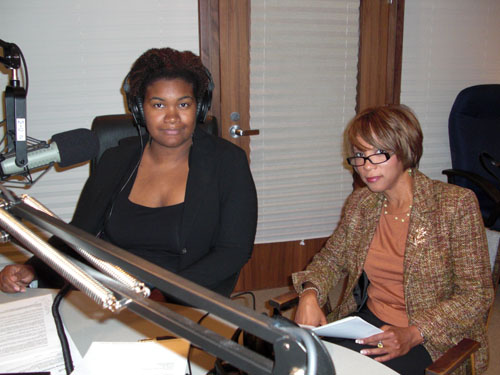
Latoya Peterson (left) interviews Sophia Nelson, Political and Social Commentator for Jet, about the prospects for high-profile Republican female candidates this election season.
Q: Who were your mentors?
A: Too many to count. I had so many great teachers (at John F. Kennedy High School) that were there for me and really helped to shape my curiosity. I think that's the biggest reason how I ended up being in this really weird career I never thought I would be in.
There was Mr. Tile, my speech coach and mentor. He was amazing and would focus on making sure my reasoning was sound and push my limits a lot, in terms of what he thought I could accomplish.
There was Ms. Aarondale who would talk about how history is this evolving thing and to understand the nuances of history is to understand humankind.
There was Ms. Jenkins who talked about how American history is this constantly evolving thing. It's also something that can be shaped by political norms.
There was Mr. Griffith, who gave me the biggest contribution in terms of civic responsibility, of understanding social issues and understanding that I could change them through the electoral process and also through speaking up.
So, a lot of the most influential people in my life are teachers. Had some great bosses as well. There was this one guy named John. Interestingly enough, he was a staunch Republican. He used to always joke that I needed to join the Republican Party post haste. Given my liberal leanings we clashed on a lot of things, but he always respected who I was and gave me opportunities to learn about the things that really allowed me to grow and stretch. The skills he allowed me to learn really served me well when I wanted to switch careers.
And, of course, my parents, who were always supportive of whatever I decided to do with my life.
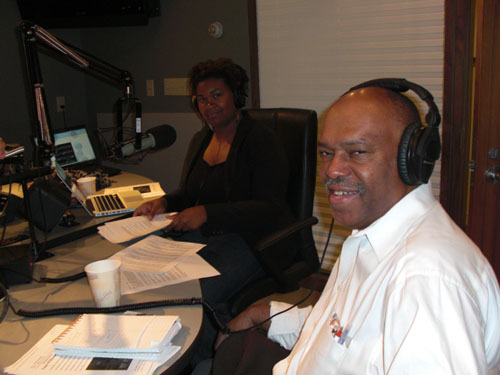
Latoya Peterson with Richard Prince, author of the popular media-focused column, Journal-isms.
Q: Any siblings?
A: Younger sister Shanice. Younger brother, DaJuan.
Q: How would you describe yourself?
A: Nerdy. Weird. Eclectic.
Can We Talk About Race?
Q: Tell me about your vision, passion ... where you direct your energy?
A: A very big passion of mine is changing the way in which we talk about race.
In particular, the ways in which minorities are depicted and represented, with an eye toward increasing understanding among different groups.
I think one of the ways in which race has changed is the fight cannot be just one racial group. It can't be just African Americans, just Latinos, just Asians, just Native Americans agitating for and hoping to work toward equality. We have to invest in each other's struggles and look for White allies who are with us to advance everything to the next level ... to have a pan-racial idea because the idea and conscience of race are changing. Trying to fight the battle with the same old tools isn't working anymore. That's one huge passion.
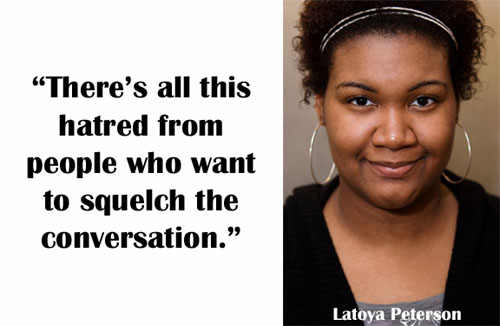
My other passion is technology, one of the main reasons why I've been able to build this career in the D.C. area, which is notoriously competitive.
Wages: High School vs College
A study recently published revealed D.C.-area high school grads average $12 / hr to live in a city with one of the highest costs of living in the United States. At the same time, college-educated professionals are making an average of $38 / hr. There's a huge income gap. I could've very easily been sucked into that lower wage life because of the decisions I made.
But at the same time, the Internet emerged as this interesting space. It was about skills and less about credentials and net worth. So there were a lot of things that were open to people (particularly people of color) on the Internet that weren't open in real life.
There's nowhere else for a person who isn't published, who isn't on somebody's payroll, to sit and talk, direct and shape conversations about national policy or about race policy or about even the direction of your favorite show. Before (the Internet) you had to go through gatekeepers. You had to send letters. You had to hope someone wanted to listen to you. The Internet made it so you can demand a seat. You can have a voice. You can demand a spot at the table. It's been such a boon to so many people I know who have been able to draw all these new careers almost out of the air at a time when we're losing so many jobs.
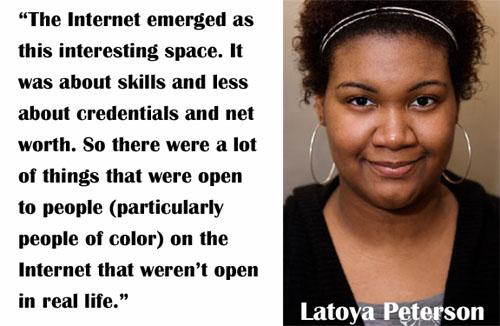
Our agricultural systems are kind of devastated. We don't have an industrial system anymore in the United States when most things are becoming service oriented. There's this whole other class of jobs that I wanted people to be exposed to. And there's so much wonder in technology. I love video games. I'm a gamer. There's a lot of things I enjoy about the online space. Just being able to Google anything you want and look for it. And have it. I think that's kind of the latent librarian in me. I always want to have access to as much information as possible. And the Internet makes that possible.
So, this big push for technology, in particular getting more people to understand the power and potential for jobs in technology, is really one of the two big things that guide me at this point.
Q: It sounds like you've turned your passion for technology into a tool that you now use to leverage your leverage your way as an entrepreneur.
A: Yes. Exactly.
Q: Do you see yourself as an entrepreneur?
A: Definitely. But first, I have to admit, I'm kind of a bum. I really am always curious and like to devote myself to projects. Then I like to chill out for a while and not do anything.
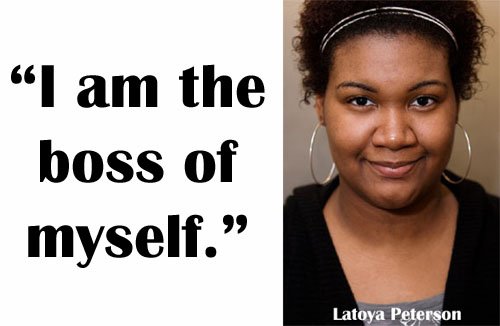
So originally my goal in life was to become an international slacker, where I had enough money, time and leisure to go where I wanted and work where I wanted and have a job that allowed me to have this kind of mobility. But at the same time to not really be obligated in the way these high-paying jobs are that tie you to a desk for 80 hours a week.
But that changed when I got more involved with Racialicious, because there's so many opportunities.
Corporate Media Control
But there's not enough minority-controlled media. There just isn't. There aren't that many spaces controlled by minorities, controlled by women that have the power to push back and have the power to discuss issues that are critical to us. To look at things through a different lens. There's tremendous power in that. In being able to have a stage and to use it for what you will.
So I found myself shifting a bit. At first, my goals were to be financially comfortable, eek out a living and have a job I didn't hate that was flexible. And now it seems like there's a bigger responsibility in that I've been able to acquire this huge platform and grow it. Now I'm asking, "OK, What can we really do with this?"
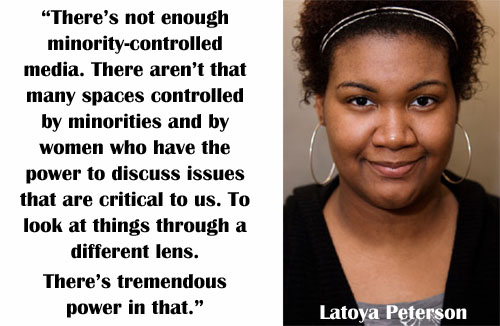
Can we provide people with the job training they need? Because that's one of those things people are up against. They don't have experience. They don't have training. They don't have their first published clips. Can we be that for some people? Can we grow this into something larger? Can we grow this into a media company?
So, I think that's the direction we're moving. What does this new media marketplace look like? What does entrepreneurship in media look like online? I feel like there's tremendous potential in this space to do it.
Q: Why is it important for there to be more Black-owned media and, in particular, women-owned?
A: One reason is the corporate control of media in general: media consolidation. Just the fact there are thousands of media outlets but when you start tracing it's really owned by basically eight people. (laughs) There just a few companies that control about 85 percent of what you watch and see. And there's just a few families in control. It's a small number, maybe 40 or so that have access into the ridiculous range of how we consume media.
And since media is how we understand ourselves and society, media helps to project not only things that provide understanding, like the news, but also projects things that stereotype. And so the media is this very powerful tool and it's really disconcerting that there aren't that many institutions dedicated to representing minorities in a fair light.
And the employment practices also reflect that. There's always a very dismal representation (percentages) of minorities on television, radio and news. It doesn't matter the format. It's all the same problem. It keeps going.
Birth of a New Nation
So when you have minority-owned organizations, you can help not only become a pipeline for people to receive training to move on, but also as an alternative voice. And you can use that very powerfully.
There was a lot to be said for BET, despite how it's been in the last 10 years or so. Because Bob Johnson was able to create that from scratch and Cathy Hughes is trying to do that with TV One and Radio One, the One Network. We really want to grow that and have it broader and have something that really reflects the new America.
The America we're growing into in 2050, which is multi-racial, multi-cultural, multi-ethnic and multi-lingual. And seeing that reflected, we should not have to wait for anybody else to lower the gate to allow us in. We should be able to make things on our own terms.
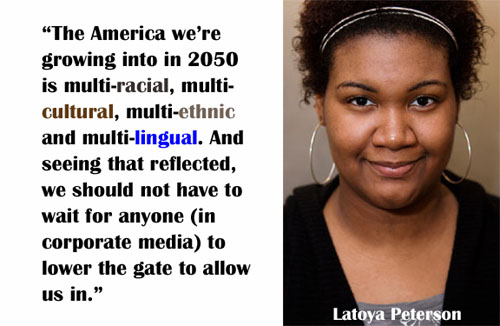
Q: And you see the Internet as a gateway?
A: Oh yeah. Now, that gateway is closing. Because just like anything that's been seen as profitable, it starts getting corporatized. There's all these battles around net neutrality. It's got a huge impact because, once again, if corporations control the Internet the way they control the airwaves and media, we'll have the same problem with very little minority representation, very few things being made for and directed toward people of color. The things we want to make, programs, news items, whatever ... things that impact our communities being marginalized because they don't feel it appeals to a mainstream demographic.
But that's not the case right now. I feel like if there's enough of us making a concerted effort to change it, then it won't be the case.
Replacing Old Guards
Q: It sounds like when you speak of corporate media, you're saying these are the White power brokers.
A: Well, that's more of a function of how our society was set up.
For a long time only White people were allowed to access these corridors of power. And then it expanded a little bit to include others types of White people. There wasn't a shot for anyone else.
And while we created small things, like the African American newspapers, African American-focused media played a huge role in reporting on segregation and things like that when White newspapers would not report on it.
And when you look at things like the Ebony-Jet archives ... when you look at this huge wealth of knowledge ... this was Black life, then. And you can see how much of our history has actually been erased just because there was nobody documenting it. It (Black life) wasn't treated as important as, for example, the New York Times archives.
If the Google project had never come by and scanned all of that and made it available, it would be lost. And I think of the dozens of African American papers that were doing amazing things, that may now be sitting in someone's basement in a box. They're fading. These are pieces of our history we won't get back. And this will continue to happen until we have equitable treatment in media.
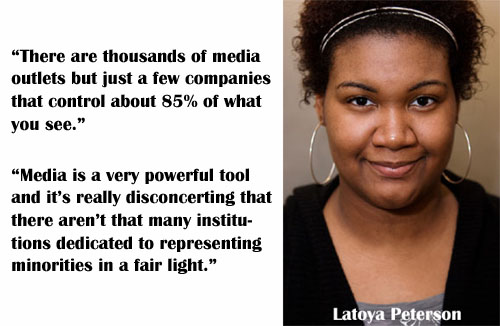
Q: If African Americans generate their own media companies and the general majority of the nation isn't interested in that information and those media do not reach the vast majority of White audiences, how will those media survive and create the impact you discussed.
A: There's a two-part answer to that.
The first one is we've already seen that White audiences are interested in this kind of media. It's very often shunted by a very small group of gatekeepers who say, 'This isn't important; this doesn't seem like news to me.' Audiences don't even get a chance to be exposed to what's going on.
At the same time, there are a lot of White audiences that watch BET. A lot watch TV One. There's a lot of crossover in what people are interested in watching.
In some ways, it's a false dichotomy, in which people say, 'Oh, the mainstream will never go for it.'
We document this on Racialicious -- where a program is successful and has a person of color in the lead role and then there's an immediate rush to justify why it was popular. It wasn't the fact that we're showing something a little different. Oh, no. It was because it was Will Smith and he's just so bankable. It was this, or it was that. And they make it seem like it's an exception to the rule, when actually people are just very interested in the literature and culture of a lot of different people.
White Privilege
Our current society is set up to privilege one viewpoint over another. And they're saying nobody will buy shows with Black leads. Nobody will buy shows with Asian-American leads. Nobody will buy Asian-American love stories. But people do. And when people understand this is available and is accessible in a way where people can get to. A lot of the things that exist now are in film festivals you have to know about to go to, to participate and support. You have to know which channels to subscribe to and they may not be in a basic cable package. You may not know about all the great stuff happening on channels 107 to 192 (laughs) because you're not getting them.
But I feel like there are networks like Current TV that are really changing this paradigm of who is considered newsworthy, who is considered interesting. At the same time, we have an increasingly multicultural and multiracial society that is looking for different types of perspectives. So the time is really right. And as we're marching toward this projected 2050 date a lot more things are going to change. So, I don't think there is a risk in terms of people being interested in content just because it's African American.
Now, creating good content with people of color? That's hard because it's hard to create good content, period! And a lot of stuff on TV right now I wouldn't call good content. A lot of what keeps people from entering these fields is how much money it costs to produce a show or a magazine. As costs come down, as people learn how to support more of these things, we'll start to see more of it.
The Internet: Media Game-Changer
Q: It sounds like you're envisioning more competition emerging that threatens the market share that corporate media hold. What you're describing sounds like emerging pieces of competition that, because it couldn't make its way vertically through corporate media, is now competing against corporate media for those eyeballs.
A: Exactly. My friend Aymar Jean Christian runs a blog called Televisual. He teaches at the University of Pennsylvania and has dedicated a whole course of study to visual culture. He believes Web TV, which is right now in its infancy and everyone is struggling to figure out how it will make money, will usher in the new wave of television and content. Because this is where creators go who have found that corporate executives say, 'There's no market for this work, we don't want to produce this, we want you to change it so it's not say gay or not so this or that.'
Online you're able to find audiences and prove your work. 'Hey, look, we have a million views on Youtube. You can say you don't want our show, but we have a million views on Youtube. We have 400,000 followers. We have 700,000 Twitter followers.'
You can't argue with numbers.
So, what you're saying is I already have this audience pre-packaged for my content that I made on a $10,000 budget. What can I do if I had $100,000?
It changes the game. And that's where I think all of this potential really lies. We're able to directly challenge it by challenging these core deeply held beliefs. Before (the Internet), there weren't metrics you could measure. It was hard to distribute content. You couldn't get it out to people. Then you had to go by whatever someone else said. And they would say this isn't going to work and that was the end of it.
Now, you just have to find your audience.
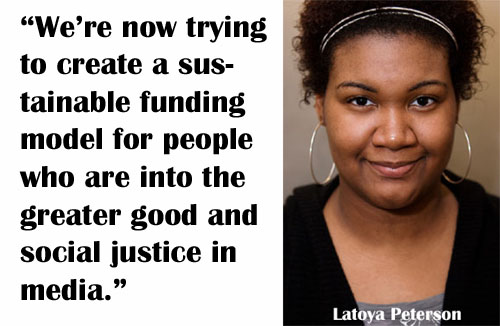
Visionary Change
Q: What does success look like down the road for Racialicious?
A: I would see us growing into television and radio ventures. Internet ventures and print magazine collaborations. Maybe even having a channel one day where people can come and interact. It would be trans-media with all of these things together.
But in the larger scope of things, using Racialicious as a hub for people to access and create content, and we're not counting anymore. That's the bigger goal. We're not saying 'Oh, my Gosh! There's two Black leads on two different shows this season.' We're not saying, 'Oh, my Gosh! This is a banner year for Asian Americans. From 1999 to 2009 there were only two or three Asian American on television at all, now we've got eight!' You know, we don't want to count anymore. It should be part of the landscape that we see. Like, we're not seeing all-White New York anymore. We're seeing this tapestry of who we are all the time. That would be success.
Sustainable Social Entrepreneurship
Q: As an entrepreneur, tell me about the future plans for your company.
A: I came into entrepreneurship in this weird backward way. There was this concept of hustle, where you can go out and make side money, side cash doing this or that, braiding hair or whatever, that a lot of folks in my family subscribe to. There's always this idea of hustle. So, it was great for me to discover that writing can be this side hustle I can do.
I backed into entrepreneurship because I got a job at the Library of Congress where I was an assistant they asked if I wanted to jump to the next level. They said they needed me to learn a little more in terms of skills, I would have to incorporate myself, become a company and they would double my salary.
I said, 'Hell yeah! I'll do that.'
So I became a consultant. It was structured very much like a regular job, only all of a sudden I had to take over my taxes and call myself a business. And this was happening at the same time I was a freelance writer. So, looking at things very loose, I am now the boss of myself. That was my whole goal in entrepreneurship: to boss myself. I didn't think anything beyond it until very recently.
For Racialicious, the philosophical side of who we are is everything we do. And we have a lot of really weird beliefs. We're not hostile to capitalism, but we don't necessarily embrace it often. So having projections and world takeover stuff ... I don't know ... it's not what we're looking at.
We've noticed there isn't an Internet revenue model. All the revenue models (new media) are based upon what people were doing with print. There's the magazine revenue model with subscriptions and ads. Or there's the newspaper model with ads and the occasional subscription. You pay for the archives. And there are some people trying to do other things with grant funding, which means you're at the mercy of whatever your funding foundation is. We decided we're not going to do that.
So, right now, we're in this really interesting exploratory phase in terms of what does it mean to try and make money on the Internet and not have a financial backer?
We've operated on no budget and no cash all this time. Our money was wrapped up in the extra stuff we've been able to do. If Carmen got a speaking gig, that was money that fed the blog. It was loosely unorganized around teams of volunteers who cared enough about it to do it.
We're now trying to create a sustainable funding model for people who are into the greater good and social justice in media. Because there isn't that big of a market for advertisers on anti-racist websites. There isn't that much money in it.
So we're trying to figure out what's the magic formula. What is the composition that will allow you to sustain yourself and grow? Is it consulting? Is it a combination of consulting and ads? Is it consulting ads and grants? What is it that allows you to have your blog and your mission, and have you meet that; and at the same time, you're sustained, your employees are sustained and we're growing from that?
We're not aiming to be a corporation. We're aiming to facilitate a way for other folks to be sustained while doing something they love, considering journalism is crumbling, the traditional media industry is crumbling and these things no longer have a designated career path. So we're kind of just pushing our way along and seeing where it goes.
Q: So you are a social entrepreneur, with social first and the entrepreneur part is the foundation upon which the social is operating?
A: Exactly.
Q: Regarding the race issue across demographics, it seems to be a very difficult discussion to initiate. Within demographics, it happens naturally. Have you engaged in recruiting or establishing relations with youth in high school and college journalism programs, where you may have a path of least resistance regarding the issue of race?
A: Being a Millennial myself, I don't think age necessarily determines how someone thinks about race. There are a lot of prejudices that still lie, in terms of how people rank others, the sexual stereotypes we apply to people, the competent stereotypes we apply to people, so age isn't always a great indicator of how someone will react.
Now, in terms of addressing the difficulty in talking about race, period, oh yes. The difficulty in running the website we run, it's a pan-racial website, is exhausting sometimes.
We look at all the different ways people don't like our message. What do Blacks and Asians have in common? Why can't people have their own space? Why do we always have to talk about mixed people? Why do we talk about indigenous people if they are only 1 percent of the population? Why do we talk about gay people? There's all this hatred from people who want to squelch the conversation. Stop the conversation and not complicate it with questions like what's the intersection between race and sexuality?
Gradual Growth
All of these things happen ... and yet our little site went from about 500 daily readers to about 2,000 daily readers when I took over the blog (2008), to now about 8,000 to 10,000 daily readers, depending on whether school is in session. And it keeps growing because people are actually hungry for substantial conversation about race. The conversation we have about race in America right now is really stilted, stale and tired. It's the same thing: the blame game. It's you can't do this, you can't do that. It's the regurgitation of stereotypes. It's a bunch of crap.
And people actually want to talk about how we make things better. How do we look at these problems that persist, like in health care? How do we look at problems that persist across racial lines? It's not a class issue. When you control for class, it's still a lot of times racial issues. So what do we talk about in terms of that?
Marginalized Pain
What are we talking about when we say we want representation of Asian Americans? My friend Jeff Yang, a writer for the San Francisco Chronicle, put out a collection of comics called Secret identity: Asian American Superhero Anthology.
Jeff tells a story through his comics. When he was younger he wanted to play Superman. And he was told there is no Asian Superman. You're not allowed. And that's painful. You can't dream. You can't do this because of who you are.
So, he carried that with him. And when he was older and had some time, he found some friends and people who thought about it. They went out and created their own comic collection. They put it out and there was a great response. And they went to ComiCon and now they have a second book deal for Secret Identities 2.
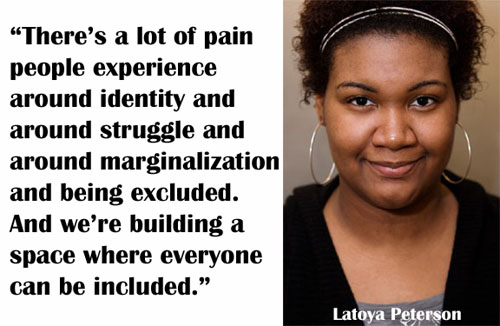
There's a lot of pain people experience around identity and around struggle and around marginalization and being excluded. And we're building a space where everyone can be included. It doesn't have to be where you're on someone else's terms. You can bring your whole self to the table. And I think there's only space for just that going forward.
We have passed the point where people are willing to accept that some people have to marginalize sometimes; you have to not be yourself anymore. We're past that point.
So, now people are just looking for what is this new solution? What is this new world we're trying to create? We're hoping to be able to show, this is what it could be.
(All Photos courtesy of I. Davar Ardalan)
?
Follow Mike Green on Twitter: www.twitter.com/amikegreen2
This entry passed through the Full-Text RSS service — if this is your content and you're reading it on someone else's site, please read our FAQ page at fivefilters.org/content-only/faq.php
Five Filters featured article: Beyond Hiroshima - The Non-Reporting of Falluja's Cancer Catastrophe.
No comments:
Post a Comment